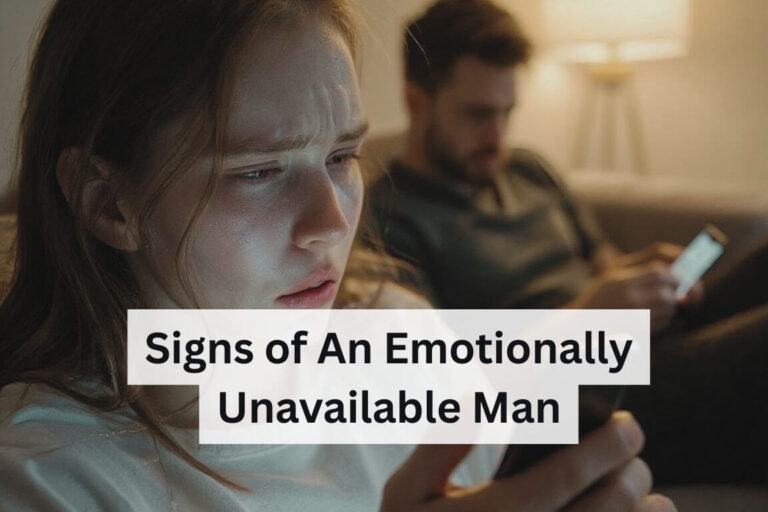That knot in your stomach when he doesn’t text back for hours. The way conversations feel shallow despite months of dating. The constant wondering if you’re asking for too much when all you want is genuine connection.
These feelings aren’t random. They’re your intuition picking up on something significant.
When someone is emotionally unavailable, they leave subtle but unmistakable traces in how they show up (or don’t show up) in relationships.
Learning to recognize these patterns can save you from months of confusion and self-doubt while helping you understand what true emotional availability actually looks like.
11 Signs of Emotionally Unavailable Men
1. The Master of Surface-Level Connection
He’s incredibly charming during light conversations about work, weekend plans, or that new restaurant downtown.
But the moment you try to share something that matters to you, your childhood fears, your dreams for the future, or even just a difficult day, you’ll notice the shift.
His body language changes, he becomes distracted by his phone, or he smoothly redirects the conversation back to safer territory. It’s like watching someone put up an invisible shield the second things get real.
This pattern reveals itself in subtle ways: he remembers your coffee order but forgets the important presentation you mentioned stressing about.
He can discuss movies for hours but grows uncomfortable when you mention feeling anxious about your relationship with your sister.
The most telling sign? During moments when you’re being genuinely vulnerable, he’ll often respond with advice, jokes, or immediate subject changes rather than simply being present with your emotions.
This isn’t about being a bad listener. It’s about being fundamentally uncomfortable with emotional depth.

2. His Past Tells a Story
When someone consistently describes their romantic history as a series of “crazy exes” or relationships that “just didn’t work out” without ever acknowledging their own role, pay attention.
An emotionally unavailable man often has a pattern of connections that never quite progress beyond the honeymoon phase.
You might notice he’s never been in a relationship longer than six months, or he speaks about past partners with a dismissive tone that lacks empathy or self-reflection.
The most revealing aspect isn’t just the brevity of his relationships, but how he talks about them.
Does he mention what he learned? Can he acknowledge any mistakes he made? Or does every story paint him as the victim of someone else’s unreasonable expectations?
This pattern suggests someone who hasn’t done the inner work necessary for lasting connection.
He may genuinely believe that he’s just been unlucky in love, but the common denominator in all these “failed” relationships is his inability to move beyond surface-level engagement.
When pressed about relationship lessons or growth, he’ll often become vague or defensive, revealing his discomfort with the kind of self-examination that healthy relationships require.
3. Communication Feels Like a Game of Hot and Cold
One day he’s texting you good morning and sharing random thoughts throughout the day. The next day, radio silence until evening, if you’re lucky.
This inconsistent communication pattern isn’t about being busy; it’s about maintaining emotional distance through unpredictability.
You’ll find yourself analyzing response times, wondering if you said something wrong, or feeling anxious when hours pass without hearing from him.
The hot and cold pattern extends beyond texting. He might be incredibly attentive and present during your dates, making you feel like the only person in the world, only to become emotionally distant for days afterward.
This creates an addictive cycle. The intermittent reinforcement keeps you hooked, always waiting for the next “hot” phase.
You might notice you’re walking on eggshells, carefully crafting messages to avoid triggering his withdrawal.
The most painful aspect is that his availability often seems to depend entirely on his mood or convenience, not on your needs or the natural rhythm of deepening connection.
When you need emotional support most, he’s often mysteriously unavailable, but when he’s feeling social or lonely, he expects you to be immediately accessible.

4. The Future is a Forbidden Topic
Mention anything beyond next weekend and watch him visibly tense up. Whether it’s a concert three months away, holiday plans, or even casual references to “someday,” he’ll deflect with phrases like “let’s just see what happens” or “I don’t like to plan too far ahead.”
This isn’t about being spontaneous. It’s about avoiding any conversation that implies you have a future together.
Even after months of consistent dating, you might realize you’ve never been introduced to his close friends or family, and your relationship exists in a carefully contained bubble. The future-avoidance runs deeper than just making plans.
He might never ask about your long-term goals, career aspirations, or where you see yourself in five years, not because he’s not curious, but because these conversations imply emotional investment and continuity.
You’ll notice that discussions about values, life philosophies, or meaningful topics that couples typically explore are consistently avoided or cut short.
This creates a strange sense of relationship limbo where you’re dating someone you know very little about on a deeper level.
The relationship feels frozen in time, neither progressing nor ending, leaving you constantly wondering where you stand and whether you’re wasting your time on someone who sees you as a temporary placeholder rather than a potential partner.
5. He Keeps You at Arm’s Length
After months of dating, you realize you know his coffee order, his work schedule, and his favorite Netflix shows, but you have no idea what keeps him up at night or what his childhood was like.
He maintains a careful distance even during intimate moments, sharing just enough to seem open while keeping the deeper parts of himself completely off-limits.
His personal space, both physical and emotional, feels like a fortress you’re never quite invited to enter.
This manifests in practical ways too. You might notice that everything happens on his timeline and his terms.
Dates are when he’s available, conversations end when he’s ready, and the pace of intimacy follows his comfort level exclusively.
He may have never invited you to his place, or if he has, it feels sterile and impersonal, like a showroom rather than a home.
The most telling sign is that after significant time together, you still feel like you’re getting to know a carefully curated version of him rather than the real person.
When you try to dig deeper with gentle questions about his fears, dreams, or what matters most to him, he’ll deflect with surface-level responses or turn the focus back to you, maintaining that invisible barrier that keeps you perpetually on the outside looking in.

6. Emotional Support is a One-Way Street
He’s your biggest cheerleader when you get a promotion or when you’re excited about something new, but the moment you need genuine emotional support, he becomes unavailable, physically, emotionally, or both.
When life gets messy, you’ll find yourself facing challenges alone, even though you’re supposedly in a relationship with someone who cares about you.
His discomfort with your emotions becomes painfully obvious through his responses.
Instead of offering comfort when you’re upset, he’ll minimize your feelings with dismissive comments like “you’re overthinking this” or “it’s really not that serious.”
He might even become visibly irritated when you express sadness, anxiety, or frustration, as if your emotions are an inconvenience to his day.
The irony is that he has no problem accepting your emotional support when he needs it, whether he’s stressed about work, frustrated with friends, or just having a bad day.
You’ve likely found yourself being his sounding board and cheerleader, but when the roles reverse, he’s suddenly too busy, too tired, or too overwhelmed to reciprocate.
This creates an exhausting dynamic where you’re constantly giving emotional energy but rarely receiving it back, leaving you feeling depleted and questioning whether your needs matter in the relationship.
7. The Defense Mechanism Expert
Ask him a simple question about his feelings or your relationship, and watch the walls go up immediately.
He’s mastered the art of deflection, using humor to brush off serious conversations, anger to shut down discussions, or complete silence to avoid engaging altogether.
What should be normal relationship conversations, like discussing where things are headed or addressing concerns, become battles that you somehow always lose.
The most frustrating aspect is how he makes you feel like the problem for wanting basic emotional connection.
When you express a need for deeper communication or more emotional intimacy, he’ll turn it around, suggesting you’re being “too needy,” “too demanding,” or “overthinking everything.”
This manipulation technique is particularly damaging because it makes you question your own reasonable expectations.
You might find yourself apologizing for having normal human needs or walking away from conversations feeling like you’re somehow asking for too much.
His defensive responses serve a dual purpose: they protect him from having to engage emotionally while simultaneously training you to stop asking for what you need.
Over time, this dynamic can erode your confidence and make you feel like you’re losing touch with what healthy communication should look like.

8. Allergic to Vulnerability
He presents himself as someone who has life completely figured out, no fears, no insecurities, no moments of doubt or struggle.
This carefully crafted image might seem attractive at first, but it reveals itself as a barrier to genuine intimacy.
True connection requires both people to show up authentically, including the messy, imperfect parts of being human.
An emotionally unavailable man treats vulnerability like a weakness rather than a bridge to deeper connection.
When you open up about your own struggles, fears, or insecurities, his discomfort becomes palpable. He might change the subject quickly, offer surface-level solutions, or even subtly judge you for having “too many issues.”
This creates a devastating dynamic where your natural human emotions and experiences are met with rejection rather than understanding.
You’ll notice he never reciprocates with his own vulnerabilities, he doesn’t share his fears about the future, his struggles with self-doubt, or even simple things like feeling nervous before important meetings.
This one-sided emotional exchange leaves you feeling exposed and alone, as if you’re the only one bringing your full self to the relationship.
Over time, you might find yourself hiding your own struggles and emotions to avoid his discomfort, essentially joining him in the shallow end of the emotional pool where real intimacy can never grow.
9. The Relationship Remains in Limbo
Six months in, and you’re still having the same surface-level conversations you had on your third date.
The relationship feels frozen in time, not moving backward enough to end, but never progressing forward enough to feel secure or meaningful.
Despite spending significant time together, you realize you don’t know him any better now than you did months ago, and more concerning, he doesn’t seem interested in knowing you more deeply either.
This stagnation becomes most apparent when you try to address the relationship directly. Questions about where things are headed or what you mean to each other create visible tension and discomfort.
He might respond with vague statements like “we’re good as we are” or “why do we need to label everything?” but these responses leave you feeling more confused than reassured.
The relationship exists in a strange bubble where you’re together but not really together, exclusive but not committed, intimate but not truly connected.
This limbo is particularly exhausting because it prevents you from making informed decisions about your emotional investment.
You can’t move forward because he won’t engage with the future, and you can’t move on because there’s just enough connection to keep you hoping things might change.
The relationship becomes a holding pattern that serves his need for companionship without requiring the vulnerability that deeper commitment demands.

10. He’s Physically Present but Emotionally Absent
He shows up to your dates, responds to your texts, and goes through all the motions of being in a relationship, but something crucial is missing.
You feel profoundly alone even when you’re sitting right next to him. His body is there, but his heart and mind seem to be somewhere else entirely.
During conversations, you’ll notice his eyes glazing over or his attention drifting, especially when you’re sharing something important to you.
This emotional absence becomes most painful during intimate moments, not just physical intimacy, but those quiet moments when couples typically feel most connected.
Instead of presence and engagement, you encounter a strange emptiness, as if he’s performing the role of being your partner rather than actually being present with you.
He might be scrolling through his phone during dinner, mentally checked out during meaningful conversations, or simply going through relationship motions without genuine investment.
The most heartbreaking aspect is that this absence often intensifies during moments when you most need his emotional presence, when you’re sharing good news and want him to celebrate with you, or when you’re struggling and need his support.
You find yourself competing with distractions for his attention, and even when you win that competition, his engagement feels hollow and obligatory rather than genuine and caring.
11. Your Intuition Keeps Whispering “Something’s Not Right”
Despite his charm, despite the good times, despite your friends saying he seems “nice enough,” there’s a persistent knot in your stomach that won’t go away.
Your inner wisdom is picking up on something your logical mind keeps trying to rationalize away. This isn’t about dramatic red flags or obvious problems.
It’s about a subtle but constant feeling that something fundamental is missing from your connection.
You find yourself making excuses for his behavior to friends and family, explaining away his emotional distance with reasons that sound logical but never quite satisfy your deeper concerns.
The relationship requires constant mental gymnastics to make sense of his inconsistencies and mixed signals.
What should feel natural and flowing instead feels like work, you’re always trying to decode his moods, manage his comfort level, or figure out where you stand.
This exhausting dynamic creates a background anxiety that colors your entire experience of the relationship.
You might catch yourself overthinking every interaction, analyzing his responses for hidden meanings, or feeling like you’re walking on unstable ground.
Your intuition is responding to the emotional unavailability that your conscious mind hasn’t fully processed yet.
Trust that persistent unease. It’s your inner wisdom recognizing that authentic love shouldn’t leave you feeling confused, anxious, and constantly questioning your worth in someone’s life.

What Does Emotionally Unavailable Mean?
The Core Definition
Emotional unavailability isn’t about someone having a bad day or going through a stressful period at work. It’s a consistent pattern of difficulty connecting with, understanding, and responding to emotions, both their own and yours.
An emotionally unavailable person struggles to create the kind of meaningful bond that healthy relationships require.
They may be physically present, charming, and even affectionate, but there’s an invisible barrier preventing deeper emotional intimacy.
Think of it this way: if emotional availability were a house, an emotionally unavailable person keeps most of the rooms locked.
You might be welcomed into the living room for surface-level conversations and fun activities, but the deeper spaces, where vulnerability, fears, dreams, and authentic connection live, remain off-limits.
The Difference Between Temporary and Chronic Unavailability
Everyone goes through phases where they’re less emotionally present. Temporary unavailability might happen during:
- Major life transitions (new job, loss of a loved one, health issues)
- High-stress periods that require intense focus
- Processing difficult emotions or experiences
The key difference is awareness and communication. Someone who’s temporarily less available will usually acknowledge it, explain what’s happening, and make efforts to reconnect when possible. They don’t leave you guessing about their feelings or your relationship status.
Chronic emotional unavailability, however, is a deeply ingrained pattern. It’s not situational. It’s how someone consistently operates in relationships.
This person may have never learned how to form secure emotional bonds, or they may be protecting themselves from perceived threats to their independence or safety.
Why Some People Become Emotionally Unavailable
Understanding the “why” doesn’t excuse the behavior, but it can help you recognize that this isn’t about you. Common roots of emotional unavailability include:
Past relationship wounds: Previous betrayals, heartbreaks, or toxic relationships can create protective walls. If someone has been hurt deeply, they might unconsciously decide that staying surface-level feels safer than risking that pain again.
Family patterns: Growing up in households where emotions were dismissed, criticized, or ignored can make emotional expression feel foreign or dangerous. Some people learned early that showing feelings leads to rejection or conflict.
Fear of vulnerability: True intimacy requires showing up authentically, flaws and all. For someone who struggles with self-worth or has a perfectionist streak, this level of openness can feel terrifying.
Attachment style: Those with avoidant attachment styles often value independence above connection. They may genuinely care about you but feel suffocated by emotional closeness.
The Impact on Relationships
When you’re involved with an emotionally unavailable person, the effects ripple through every aspect of the connection. You might find yourself:
- Constantly questioning where you stand
- Making excuses for their behavior to friends and family
- Feeling like you’re giving much more than you’re receiving
- Experiencing anxiety about the relationship’s future
- Wondering if you’re “too much” or “too needy”
The relationship often feels like it’s stuck in neutral, never moving backward enough to end, but never moving forward enough to deepen.
This emotional limbo can be exhausting and can significantly impact your self-esteem and mental health.
What Emotional Unavailability Is NOT
It’s important to distinguish emotional unavailability from other relationship challenges:
- It’s not introversion: Introverts may need more time to open up, but they’re capable of deep emotional connection once trust is established.
- It’s not being “low-maintenance”: Someone who’s genuinely low-maintenance still shows genuine interest in your emotional world.
- It’s not masculine stoicism: Healthy emotional expression isn’t about gender. It’s about human connection.
- It’s not just “taking things slow”: Taking time to build trust is healthy; avoiding emotional connection entirely is not.
The crucial difference lies in willingness and capacity. An emotionally available person might need time or encouragement, but they demonstrate genuine interest in creating deeper connection.
An emotionally unavailable person consistently deflects, avoids, or minimizes opportunities for meaningful emotional exchange.

Moving Forward
Trusting Your Inner Voice
The first step in moving forward is acknowledging what you already know deep down. If you’ve recognized multiple patterns from this list, your intuition has been trying to tell you something important.
Stop second-guessing yourself or making excuses for behaviors that consistently leave you feeling unsettled. Your emotional needs aren’t “too much”. They’re human, valid, and deserving of respect.
Sometimes we stay stuck because we’re hoping the person will change, or because we’ve invested so much time and energy that leaving feels like admitting failure.
But recognizing emotional unavailability early actually demonstrates wisdom and self-respect, not weakness. Your time and emotional energy are precious resources that deserve to be invested in connections that can genuinely reciprocate your care.
Having the Conversation (Or Deciding Not To)
If you’re unsure whether someone is temporarily struggling or fundamentally emotionally unavailable, one honest conversation can provide clarity
Approach it from a place of curiosity rather than accusation. You might say something like, “I’ve been feeling disconnected in our relationship lately, and I’m wondering if you’ve noticed that too. Is this something we can work on together?”
Pay attention not just to what they say, but how they respond. An emotionally available person who’s going through a rough patch will typically acknowledge your concerns, express genuine interest in improving the connection, and show willingness to be part of the solution.
An emotionally unavailable person will often become defensive, minimize your feelings, or make you feel like you’re asking for too much.
However, remember that you don’t owe anyone multiple chances to meet your basic emotional needs. If you’ve already had several conversations about feeling disconnected or unsupported, and nothing has changed, that’s your answer.
Actions speak louder than promises, and consistent patterns speak louder than occasional efforts.
Setting Boundaries with Yourself
One of the most important boundaries you can set is with your own hope and expectations. Stop waiting for someone to become emotionally available if they’ve consistently shown you they’re not.
This doesn’t mean becoming cynical about love. It means being realistic about what this particular person can offer you right now.
Create internal boundaries around how much emotional energy you’ll invest in trying to make the relationship work.
Stop overanalyzing their every response, stop making excuses for their behavior to your friends, and stop sacrificing your own emotional needs to accommodate their limitations.
These behaviors keep you trapped in cycles that drain your energy without creating the connection you’re seeking.
Consider what you would tell a close friend in your situation. Often, we give others advice we struggle to follow ourselves, but this outside perspective can help clarify what healthy boundaries look like in your specific situation.
Recognizing What Healthy Connection Looks Like
After experiencing emotional unavailability, it’s important to recalibrate your expectations around what healthy relationships actually feel like.
Healthy emotional connection doesn’t require constant work, analysis, or walking on eggshells. It flows naturally, with both people showing genuine interest in each other’s inner worlds.
In emotionally healthy relationships, difficult conversations happen but don’t feel like battles. Both people can express needs without being made to feel needy.
There’s reciprocity in emotional support, consistency in communication, and a natural progression toward deeper intimacy over time. Most importantly, you feel secure in knowing where you stand with the other person.
If you’ve been in emotionally unavailable relationships for a while, genuine emotional availability might initially feel unfamiliar or even boring. Don’t mistake drama and uncertainty for passion. Real love creates calm, not chaos.
Taking Care of Your Own Emotional Needs
Whether you decide to stay and work on things or choose to move on, prioritize your own emotional wellbeing.
Reconnect with friends and activities that make you feel valued and understood. Notice how much mental space this relationship has been occupying and deliberately redirect some of that energy toward things that genuinely nourish you.
Consider whether patterns of attracting emotionally unavailable people might reflect your own relationship with vulnerability or past experiences that need attention.
Sometimes we unconsciously choose partners who confirm negative beliefs we hold about ourselves or recreate familiar dynamics from our past.
This isn’t your fault, but understanding these patterns can help you make different choices going forward.
When Professional Support Helps
If you find yourself repeatedly attracted to emotionally unavailable people, or if leaving this relationship feels impossible despite recognizing it’s unhealthy, talking with a therapist can provide valuable perspective.
Professional support isn’t just for crises. It’s also incredibly helpful for understanding your relationship patterns and developing the tools to create healthier connections in the future.
A skilled therapist can help you explore why emotional unavailability might feel familiar or comfortable, work through any past experiences that influence your current relationships, and build confidence in trusting your own emotional instincts.
This investment in yourself pays dividends in all your future relationships.


